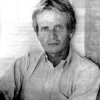Bruce Chatwin

Bruce Chatwin
Charles Bruce Chatwinwas an English travel writer, novelist, and journalist. His first book, In Patagonia, established Chatwin as a travel writer, although he considered himself instead a storyteller, interested in bringing to light unusual tales. He won the James Tait Black Memorial Prize for his novel On the Black Hilland his novel Utzwas shortlisted for the Man Booker Prize. In 2008 The Times named Chatwin #46 on their list of "50 Greatest British Writers Since 1945."...
NationalityEnglish
ProfessionNovelist
Date of Birth13 May 1940
I slept in black tents, blue tents, skin tents, yurts of felt and windbreaks of thorns. One night, caught in a sandstorm in the Western Sahara, I understood Muhammed's dictum, 'A journey is a fragment of Hell.'
The usual run of children's books left me cold, and at the age of six I decided to write a book of my own. I managed the first line, 'I am a swallow.' Then I looked up and asked, 'How do you spell telephone wires?
I will go to France, to Yugoslavia, to China and continue my profession. 'As sanitary engineer?' No, Monsieur. As adventurer. I will see all the peoples and all the countries in the world.
And the formation of man is the most pressing problem facing humanity.
Being lost in Australia gives you a lovely feeling of security.
I learned about Chinese ceramics and African sculptures, I aired my scanty knowledge of the French Impressionists, and I prospered.
It's an old sailor's idea that every ship has a rope with one end made fast to her bows and the other held by the loved ones at home.
Sluggish and sedentary peoples, such as the Ancient Egyptians-- with their concept of an afterlife journey through the Field of Reeds-- project on to the next world the journeys they failed to make in this one.
The word story is intended to alert the reader to the fact that, however closely the narrative may fit the facts, the fictional process has been at work.
Anything was better than to be loved for one's things.
For life is a journey through a wilderness
When people start talking of man's inhumanity to man it means they haven't actually walked far enough.
Proust, more perspicaciously than any other writer, reminds us that the 'walks' of childhood form the raw material of our intelligence.
I pictured a low timber house with a shingled roof, caulked against storms, with blazing log fires inside and the walls lined with all the best books, somewhere to live when the rest of the world blew up.